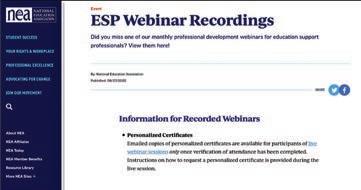
5 minute read
of Black Lives Matter NEA provides resilience seminar for ESPs
SAMSUNG STEM CONTEST OFFERS PRIZES FOR INNOVATIVE STUDENT IDEAS » Classrooms might look a lot different this year, but good ideas can come from anywhere! The Samsung “Solve for Tomorrow” contest asks students to come up with creative solutions for issues or problems in their local communities. The winner of First Place will receive $100,000 in classroom tech and supplies for their school! You don’t have to be a STEM teacher to apply for your students, but the project does need to have a STEM focus and must have a clearly defined impact on the community. The deadline to submit applications is December 13, 2020. Visit https://www.samsung.com/us/solvefortomorrow/ for more details and to apply.
OREGON LAUNCHES EDUCATION SUPPORT PROFESSIONAL OF THE YEAR AWARD
Advertisement
The Oregon Teacher of the Year program has been recognizing the achievements and contributions of our state’s greatest teachers for 75 years. With the passing of House Bill 2964 in May 2019, Oregon Education Support Professionals (ESPs) are finally receiving some well-deserved recognition of their own.
Our schools would not function without the support of our instructional assistants, food service workers, transportation providers, clerical and custodial staff. The success of our students depends on their hard work and dedication to public education. At the 2017 OEA Representative Assembly, our members voted in favor of New Business Item 16, which asked that OEA research the necessary steps to create a statewide ESP award, akin to the Teacher of the Year Award. Our Government Relations team spent two years coordinating with state lawmakers to help craft a bill to accomplish this goal, which was passed unanimously by The Oregon House of Representatives last year.
The winner of the award will receive a $5,000 prize, along with opportunities for speaking engagements at statewide events.
On the official nominations launch day, ODE Director Colt Gill expressed a great appreciation for Oregon’s ESPs: “Day in and day out, online or in-person, Oregon students benefit enormously from the support and commitment of Education Support Professionals. From direct support for students to helping teachers prepare materials for lessons, ESP’s fill countless, critical roles that ensure our education systems reach every student.”
Nominations are open until January 3, 2021. To submit a nomination, visit www. oregonteacheroftheyear.org/nominate-esp/.
NEA provides resilience seminar for ESPs
The COVID-19 pandemic has caused a massive shift in the duties and expectations of ESPs, exacerbating feelings of underappreciation that many ESPs already feel within their working environments.
Many are experiencing anxiety, fear, and frustration with the lack of communication they receive from their district leadership. In September, NEA partnered with Yale University’s Center for Emotional Intelligence to host a webinar to provide social and emotional learning (SEL) techniques exclusively for Education Support Professionals. Tools and tips, such as developing self-awareness in order to recognize emotions, and nurturing a growth mindset were facilitated by Chris Cipriano, the Director of Yale’s CEI. Over 1,500 ESPs attended the live webinar, but NEA has made it available as a recorded session. Visit www.nea. org/resource-library/esp-webinarrecordings to access this and other great ESP resources!

LOOKING FOR STUDENT LOAN DEBT RELIEF? » The NEA Student Debt Navigator, powered by Savi, is an easy, interactive tool that helps you find the student loan forgiveness programs and repayment plans for which you qualify. “We designed the platform to cut through the confusion and anxiety around student debt. We wanted people to understand all their options—including potential forgiveness—and then make it really easy to enroll and stay up to date," says Savi co-founder Tobin VanOstern. Learn more: www.neamb.com/products/nea-student-debt-navigator.
MISSING TESTING DATA OPENS DIALOGUE ABOUT STATEWIDE TESTING REFORMS

The Oregon DOC ousts community college-led adult-education programs
Citing cost-cutting as a major factor in the decision, the Oregon Department of Corrections has severed ties with six community colleges who have delivered high school-equivalency or GED programs to adult inmates for nearly fifteen years.
The current partnership with Oregon’s community college system has been incredibly successful. Oregon has the fourth highest pass rate in the country for adult inmates who have entered a GED program.
The DOC has tried to take on adult-education programs in-house before, from 2003 – 2006. Completion rates plummeted, costing the state additional resources. During that time period, the Oregon State Penitentiary only completed 14 GEDs total.
OEA President John Larson voiced opposition to this decision in this statement: “The DOC’s recent proposal to end this critical relationship threatens years of progress that have been made at our correctional facilities
and will leave adult learners behind.”
The Oregon Department of Education (ODE) released the annual district and school report cards in midOctober, but among the key performance indicators that were absent from the “ata-glance” reports due to school closures were Smarter Balanced test scores. As schools shuttered abruptly in March to prevent the spread of COVID-19, many students were unable to sit for statewide exams.
Educators and parents have long criticized Smarter Balanced due to the time and effort spent preparing students for the exam, which many have said would be better spent on engaging students in core curriculum. OEA has also opposed the weight assigned to statewide summative testing, detailed in our report “New Path for Oregon: System of Assessment to Support Student Learning”.
ODE Director Colt Gill says that the emphasis on summative testing has been “quietly reduced” in favor of more individualized assessments that are currently being used by teachers in virtual classrooms. He also points out that state money has gone directly to these kinds of teacher-led assessments rather than on facilitating Smarter Balanced Assessments. “I think this is a tremendous opportunity for that,” Gill says.
Online charter school enrollment is up, but graduation rates remain abysmally low
While a large majority of schools remain closed across the country, many parents are choosing to enroll their students in full-time online charter schools.
Oregon is no outlier; nearly 30 districts around the state have reached their 3 percent cap on online charter enrollment. But how do these virtual schools stack up against brick-and-mortar public education institutions? According to a study conducted by Education Week Research Center in 2019, only 37 percent of online charter high schools nationwide had graduation rates above 50 percent. Nationally, there are around 160 virtual charter schools providing education to upwards of 30,000 high school seniors. In some states, not one program has a graduation rate above 50 percent. Of Oregon’s three largest and most established online charter schools, only one has consistently graduated more than half of its high school seniors over the last five years. Only 37% of online charter high schools nationwide had graduation rates above 50%










